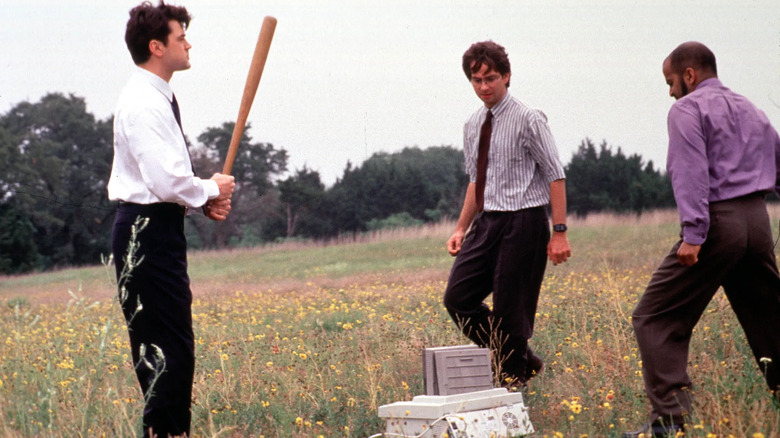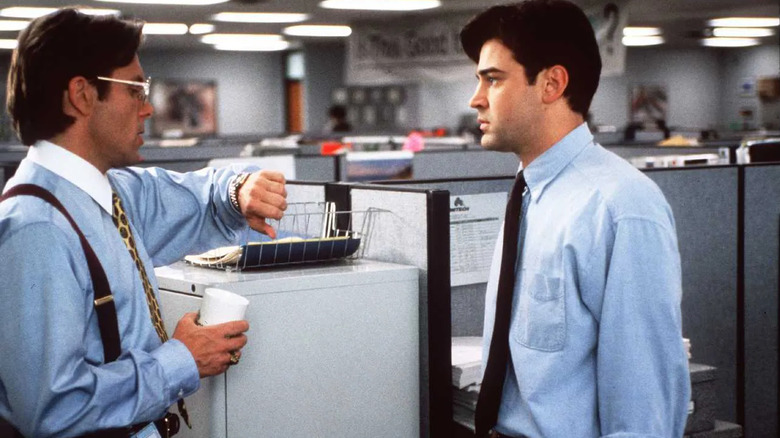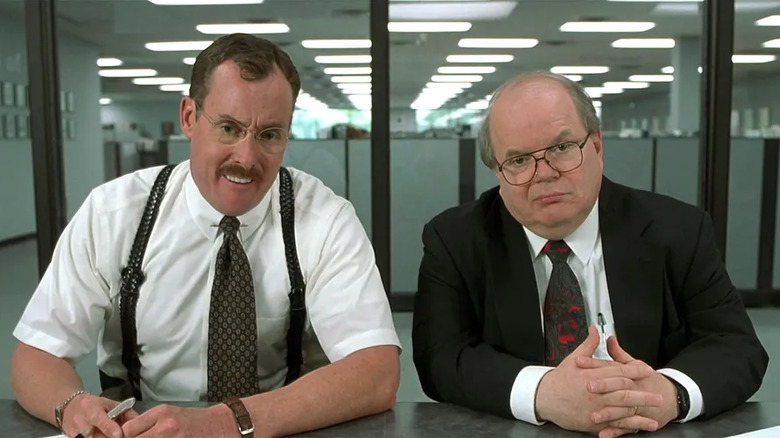Why Office Space Drove Fox Executives Crazy Before It Was Released
Mike Judge's 1999 film "Office Space" was a late bloomer. The workplace comedy is about three frustrated software company employees about to be downsized who hatch a plan to get revenge on their greedy bosses. It offered a biting yet hilarious critique of the modern workplace, but the movie was initially considered a flop, barely covering its $10 million budget at the box office. However, through word of mouth, DVD sales, and rentals, "Office Space" would eventually become a cult classic.
Over the years, it's become clear that audiences feel a deep connection to "Office Space" and its material. From the refusal by Joanna (Jennifer Aniston) to wear the required number of pieces of flair at Chachki's to the cathartic beatdown of the company printer by Peter (Ron Livingston) and friends, audiences bonded with the characters and related to their experiences.
"Office Space" has become the inspiration for well-known quotes and recurring internet memes. But like the tactless boss Bill Lumberg (Gary Cole) from the movie, studio executives at 20th Century Fox didn't have any idea what they had at the time, fighting Mike Judge on his choices every step of the way.
The studio didn't like much of anything
Delayed success could be a theme for Mike Judge, who experienced the same thing with his 2006 film "Idiocracy." The reason seems to be the source material of his movies and the studios' inability to "get it." Movies are all about creating a connection with audiences. Ironically, there seems to be a big disconnect between audiences and the people in charge of the film studios.
In an interview with The AV Club, Judge pointed out that the backgrounds of most movie execs and filmmakers are very different from the everyday person. Judge said:
"It kind of hit me at some point during the process that most people in the film business — not just the executives, the people who make them, too — tend to come from pretty upper-class backgrounds. If they go work a job, it's to have that experience, that sort of thing. After they graduate college, they have time to go visit Europe and take some time off and get their heads together."
Judge went as far as calling the film "a movie that me and a couple of my friends and my brother would think is funny," saying he had to fight the studio for every decision. He added that 20th Century Fox didn't like the soundtrack, the casting, or "much of anything." Once production was finished, however, it didn't take Judge long to realize he might be on to something big.
'OK, this is it, and it's not going to get any better'
Judge recalled a time during post-production on "Office Space" when he heard some of the studio accountants quoting the movie. That's when he realized it was going to resonate with others. These people were the true test audience, not the stuffy studio execs. As Judge notes, studio heads "hadn't had to sit there in a cubicle and go, 'Okay, this is it, and it's not going to get any better. And maybe when I'm 58, I can retire.'"
Despite clashes with the studio, Judge said it was satisfying to make "Office Space" and calls the long-term success of the movie vindicating. In a way, it makes perfect sense that 20th Century Fox executives hated the movie. In a sense, they were the butt of the joke, the reason TPS reports exist (if film studios used them). In a critique of American office life, the film purposely mutes characters' wardrobes so that they blend in with cubicle walls while simultaneously deafening them with the cacophony of their office dwelling. "Corporate Accounts Payable, Nina speaking. Just a moment!" still echoes in my head, and I didn't have to work 40 hours a week at Initech (and, mmm...yeaaaah, maybe even Saturdays).
The beauty of "Office Space" is how it captured the mundane, day-to-day life of the modern American office worker. The film was a precursor to NBC's "The Office," the immensely popular workplace mockumentary sitcom that ran for nine seasons. Series creator Greg Daniels (a collaborator with Mike Judge on "King of the Hill") also had to fight to get the sitcom made. If studio execs would finally realize that audiences continue to be fascinated by comedic takes on office life, that'd be greaaaat. If they don't, maybe they should be the ones meeting with the Bobs.


